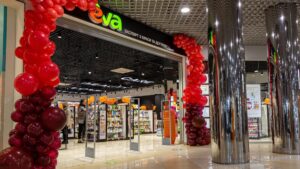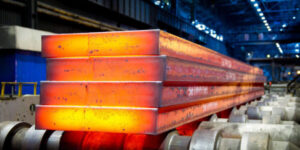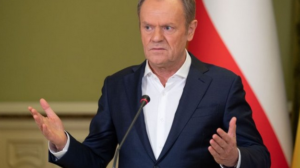
Rush LLC, the owner of the EVA network in Ukraine, will allocate UAH 179.1 million of its net profit for the third quarter of 2024 to pay dividends.
According to the company’s announcement in the information disclosure system of the National Securities and Stock Market Commission (NSSMC), the sole member of the LLC made the decision on November 28.
Thus, the distribution of 50% of the net profit received in the third quarter of 2024 – UAH 179.1 million out of the total profit of UAH 358.3 million – was approved for the payment of dividends. Dividends will be paid no later than six months after the decision is made.
Earlier, in September, the company allocated UAH 133.8 million of its net profit for the second quarter of this year to pay dividends, and in July – UAH 148.8 million of its profit for the first quarter.
Rusch LLC, which manages the EVA network, was founded in 2002. As of June 31, 2024, the chain had 1080 operating stores.
According to Opendatabot, the owner of Rush LLC is Cyprus-based Incetera Holdings Limited (100%), with Ruslan Shostak and Valeriy Kiptyk as the ultimate beneficiaries.
At the end of 2023, the company’s revenue increased by 33.7% to UAH 21 billion compared to 2022, net profit by 26% to UAH 2.2 billion, and asset value by 45.2% to UAH 15.03 billion. In 2023, EVA paid UAH 2.02 billion in taxes and fees to the budgets of all levels.

SE Guaranteed Buyer has determined the winner of this year’s second auction for the allocation of quotas to support the construction of renewable energy facilities (“green” auctions), which offered 11 MW of alternative energy sources other than solar and wind energy. According to the website of Guaranteed Buyer, the bidder with the lowest price offer of 11.1 euro cents per 1 kWh, who intends to sell a 900 kW hydropower facility (the maximum price is 12 euro cents/kWh), won the auction.
Earlier, Energoreforma reported that Waterstrum LLC with an offer of 900 kW at a price of 11.1 euro cents/kWh and Liga. Ltd. with an offer of 999 kW at a price of 11.9 euro cents/kWh. Both companies, one of whose activities is electricity production, are registered in Lviv region and intended to build hydropower facilities.
In this regard, Guaranteed Buyer clarified that, in accordance with the law, a mandatory condition for holding an auction is to ensure competition, and the amount of capacity for which its participants are entitled to support cannot exceed 80% of the total capacity offered by all participants. Thus, the total quota for distribution at this auction amounted to 1519.20 kW.
As Guaranteed Buyer explains, under the terms of the auction, the second participant has the right to accept the remaining part of the quota (approximately 600 kW of electricity) or to withdraw from the winner’s status without losing the bank guarantee, but not earlier than 30 business days from the date of the auction. As reported, the first-ever green auction of Guaranteed Buyer for the distribution of 11 MW of solar power plants on October 31 did not take place due to the lack of participants.
On November 14, a second auction was held for 11 MW of other types of RES (small hydropower plants, bioenergy), and a third auction is scheduled for November 29, the last one within the 110 MW of new RES capacity allocated for the year. The auction will include 88 MW of wind power.

Ukrainian enterprises and organizations increased their pre-tax profit from ordinary activities by 48.2% to UAH 720.6 billion in January-September 2024 (UAH 486.3 billion in the first nine months of 2023), the State Statistics Service reported on Friday. According to the State Statistics Service, in January-September 2024, Ukrainian enterprises that operated profitably received UAH 892.788 billion in profit, which is 40% more than in the same period in 2023.
At the same time, 24.9% of enterprises reported negative financial results. Their losses for the first nine months of this year increased by 13.6% compared to the same period in 2023, to UAH 172.15 billion.
The official exchange rate as of November 29 is 41.5956 UAH/$1.

Poland will expand the “Eastern Shield” fortification system from the border with Russia and Belarus also to the Ukrainian border, Polish Prime Minister Donald Tusk said, Polskie Radio reported.
“Everything we are doing here and will also do on the border with Belarus and Ukraine is aimed at deterring and discouraging the alleged aggressor, so this is really an investment in peace. We will spend billions of zlotys on this, but now the whole of Europe is watching with great pleasure and will support this investment and our activities if necessary. Our activity also concerns border security with Ukraine – for other reasons, but we want Poles to feel safer along the entire length of the eastern border,” Tusk said during a visit to the first constructed section of the fortifications.
He emphasized that the construction of the Eastern Shield will make the Warmian-Masurian, Podlaskie, Lubelskie and Podkarpackie voivodships, which are in Poland’s border regions, safer.
“The better the Polish border is guarded, the less accessible it is to those who would have bad intentions,” the prime minister pointed out.
Tusk assured that countries in the Baltic region will cooperate with Poland to ensure that this infrastructure is effective not only in Polish sections, but also along the entire border, “above all with Russia and Belarus.”
“Eastern Shield” is a program prepared by the Ministry of National Defense and the General Staff of the Polish Army, which involves the construction of various types of fortifications, relief barriers and military infrastructure on Poland’s borders with Russia and Belarus – a total distance of about 800 km. It is also planned to build appropriate intelligence and threat detection systems, forward bases, logistics hubs, warehouses and deploy anti-drone systems.

Ukraine’s largest coffee chain Aroma Kava has officially expanded its presence on the international market and opened a new coffee shop in Warsaw, Forbes Ukraine reports.
“The chain will be developing in Poland based on a franchise model. The first franchise partners are Ukrainians who have been living in Poland for a long time,” Aroma Kava co-investor Gennady Gaydabura told the publication.
Aroma Kava offers several formats of cafes. The most compact ones occupy only 6-9 square meters, while large cafes are located in premises up to 150 square meters.
The first Aroma Kava in Poland started its work at 136 Marshalkowska Street in the premises that used to house a Subway restaurant. A Carrefour supermarket and a Millennium Bank branch are located next door to the coffee shop. The Warsaw location represents one of the largest formats of the chain. According to Aroma Kava representatives, the cost of opening a coffee shop in Poland is 30-40% higher than the investment in a Ukrainian one.
The coffee shop in Warsaw is not the first attempt by Aroma Kava to enter the international market. In 2020, the chain opened a franchise in the center of Minsk, but it stopped working with the outbreak of a full-scale war. The company made its second attempt to expand abroad in January 2023. A franchise coffee shop was opened in the student district of the Bulgarian capital Sofia. According to the chain’s website, Aroma Kava was registered in 2013 and has more than 350 coffee shops in 45 cities of Ukraine. The chain’s baristas prepare over 1 million cups of coffee per month.

In Ukraine on the first day of winter will be without precipitation, in most parts of the territory, except for the south-east, fog, reports Ukrhydrometcenter. Wind of variable directions, 3-8 m/s. The temperature at night and in the afternoon from 2° frost to 3° heat (at night in the Carpathians 1-6° frost, during the day in the western regions and in the extreme south of the country 3-8° heat).
December 1 in Kiev is also without precipitation. Fog, wind of variable directions, 3-8 m/s. The temperature is about 0° at night, 1-3° warm during the day.
According to the Central Geophysical Observatory named after Borys Sreznevsky in Kiev. Borys Sreznevsky in Kiev on December 1, the highest daytime temperature was 13.0° in 1898, the lowest nighttime temperature was -20.6° in 1998.
Monday, December 2 in Ukraine is also without precipitation. In most parts of the territory, except for the southern part, at night and in the morning in some places fog.
Wind of variable directions, 3-8 m/s.
The temperature at night 0-5° frost, during the day from 2° frost to 3° warm; in the southern part and western regions at night about 0°, during the day 1-6° warm; in the Carpathians at night 5-10° frost, during the day about 0°. In Kiev on December 2, no precipitation.
The wind is variable, 3-8 m/s. The temperature is 0-2° frost at night and 0-2° warm during the day.